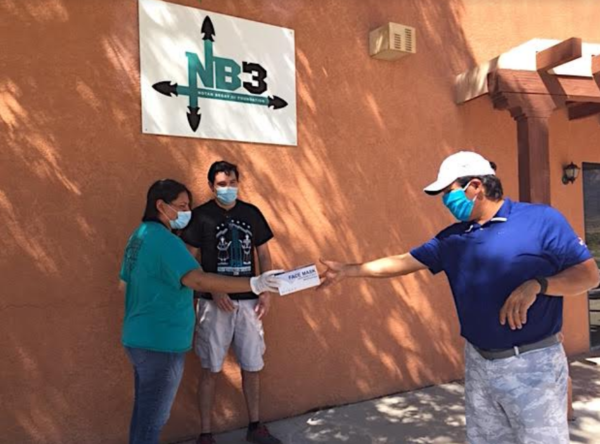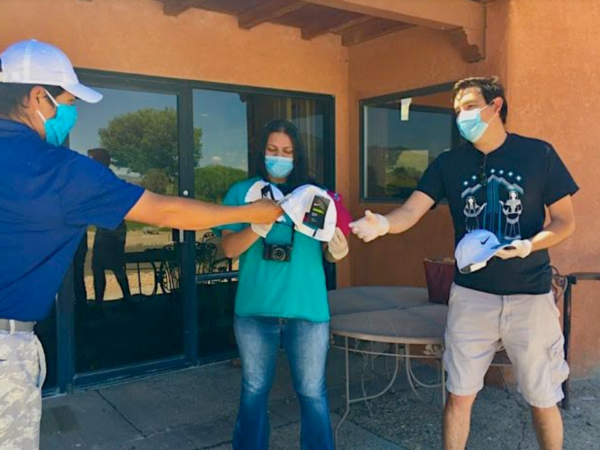
- Details
- By Native News Online Staff
ALBUQUERQUE, N.M. – For nine Tribes with rural homelands nestled in California’s High Sierra, creating youth programs to promote health through sports and physical activity has long been a challenge.
Rural mountain and high desert communities have slim school budgets, limited facilities and coaches, inadequate internet, and a lack of funding for wellness and recreation programs. While nearby ski resorts and golf courses attract affluent tourists, the cost of golf and ski equipment is out of reach for most Native youth. The same is true of climbing and hiking, making it hard for children to access sports and recreation offered in their own backyards.
As part of a growing Tribal wellness movement in California, Jesse Archer, Big Pine Paiute Tribal Council Secretary, and Mariah David, director of Lone Pine Paiute Tribe’s wellness programs, decided to reach out to the Notah Begay III Foundation (NB3) to explore ways to bring NB3’s extensive youth programs to local tribes including the Antelope Valley Indian Community in Coleville; Big Pine Paiute Tribe, Bishop Paiute Tribe, Bridgeport Indian Reservation, Fort Independence Indian Reservation, Kutzad Ka Paiute Tribe in Lee Vining; Lone Pine Paiute-Shoshone Reservation, Utu Utu Gwaitu Tribe in Benton; and the Timbisha Shoshone Tribe in Death Valley.

2) Notah Begay III gifted Big Pine Tribal Council Secretary Jesse Archer with signed NB3 hats.
After a self-quarantine period, Archer and David traveled to New Mexico on May 23 to meet with NB3 officials, Navajo Nation Council delegates, and Native economic development experts in a series of brief meetings.
When word came that Notah himself was going to attend the NB3 social-distancing outdoor meeting, Archer was especially excited. Begay was adamant that masks, gloves and social distancing be used as the group met standing 8-10 feet apart on Santa Ana Pueblo’s Golf Club where NB3 Foundation offices are located.
“As vice-president of the Native American Junior Golf Association, I was hoping to bring Notah to our communities to inspire our people and help us figure out what programs work best for our youth,” said Archer. “We were very honored that he took the time to meet us and discuss the possibilities for wellness programs and junior golf.”
Begay, a Stanford University graduate with a degree in finance, also took time to film several positive messages to share with Native youth nationwide to protect their families and Tribal nations.
“It’s important to social distance,” Begay said. “It’s important to follow all those safety precautions and policies set forth by our state and our tribal governments because social distancing has proven to work to flatten the curve and minimize our risk to exposure to the COVID 19 virus.
“But more importantly, it prevents us from exposing our Tribal elders,” he added. “We really need to protect our Tribal elders, and we need to go out of our way to make sure that we’re looking out for the welfare of our entire communities. So please take those safety precautions seriously, do everything you can. Wash your hands, no social gatherings, and together we can all work through this thing and come out better on the other side.”
As the meeting wrapped up, Begay gifted signed hats, and accepted boxes of protective masks donated by Lone Pine Tribe that were purchased from Joseph Moose, a Bishop Paiute Tribal citizen who owns SunLand Global Inc., which supplies N95 and KN95 masks, 3-ply surgical masks, US-manufactured sanitizers, antibacterial soap, disinfectants, hand sanitizers and other PPEs to Tribes.
“While many businesses are using COVID-19 to inflate the prices of critical items, we’re working to source FDA-approved medical masks and sanitizing products at fair prices to Tribes,” said Moose. “As a Native American business owner, I was witnessing the shortage of PPEs and disappointed that many companies were using this shortage to gouge the market for a quick dollar. I wanted to help. We’re very pleased to provide protective masks to NB3.”
Begay, who is Diné, San Felipe Pueblo and Isleta Pueblo is a four-time PGA Tour winner and is currently analyst for NBC Sports and the Golf Channel. He founded NB3 in 2005 starting with a junior golf program headed by Notah’s father, Notah Begay, Jr. Native youth from the Albuquerque area were introduced to golf and to the positive impact sports can make on a young person’s life: discipline, goal-setting, etiquette, pride and health.
As the NB3 Foundation’s scope and reach expanded, additional programs were created for Native children’s health. In 2009, the NB3 launched a comprehensive health and wellness program to ensure a holistic approach in addressing childhood obesity and Type 2 diabetes among Native American children. NB3 also initiated a soccer program at the Pueblo of San Felipe, which included the first-of-its-kind professional sports field at a Pueblo. https://nb3foundation.org/
More Stories Like This
Native News Weekly (August 25, 2024): D.C. BriefsNavajo Nation Mourns the Passing of Former Vice President Rex Lee Jim
Deb Haaland Earns Endorsement From Communications Workers of America Local 7076
University Soccer Standout Leads by Example
Two Native Americans Named to Democratic Congressional Campaign Committee's“Red to Blue” Program
Help us defend tribal sovereignty.
At Native News Online, our mission is rooted in telling the stories that strengthen sovereignty and uplift Indigenous voices — not just at year’s end, but every single day.
Because of your generosity last year, we were able to keep our reporters on the ground in tribal communities, at national gatherings and in the halls of Congress — covering the issues that matter most to Indian Country: sovereignty, culture, education, health and economic opportunity.
That support sustained us through a tough year in 2025. Now, as we look to the year ahead, we need your help right now to ensure warrior journalism remains strong — reporting that defends tribal sovereignty, amplifies Native truth, and holds power accountable.
 The stakes couldn't be higher. Your support keeps Native voices heard, Native stories told and Native sovereignty defended.
The stakes couldn't be higher. Your support keeps Native voices heard, Native stories told and Native sovereignty defended.
Stand with Warrior Journalism today.
Levi Rickert (Potawatomi), Editor & Publisher

